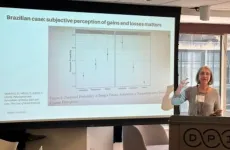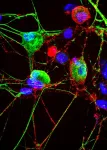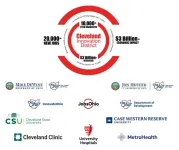(Press-News.org) The theories offered by the dominant literature in political science today to try to explain the sources of the political polarization that has endangered democracy around the world are adequate for the United States and Europe, but do not make sense for the countries of Latin America. For this reason, greater collaboration among political scientists is needed to identify other, more plausible hypotheses for the phenomenon that the region is also experiencing.
The assessment was made by researchers participating in a panel discussion on democracy and social inclusion held on April 9 in Chicago (United States) during FAPESP Week Illinois https://fapesp.br/week/2024/illinois.
“There’s an avenue for possible research collaboration between Latin American and North American political scientists, for example, to advance in identifying the sources of political polarization in the two regions and to overcome this challenge in the literature. We have a lot of data and interest in working together to better understand this phenomenon,” said Marta Arretche, professor at the University of São Paulo (USP) in Brazil and researcher at the Center for Metropolitan Studies (CEM) – a FAPESP Research, Innovation and Dissemination Center (RIDC).
According to the researcher, the most influential literature in the social sciences today, mainly in the United States and Europe, establishes a positive link between social inequality and political polarization to explain the rise in electoral strength of extreme right-wing parties and the threats to democratic institutions.
According to this theory, wealthier democracies have experienced an increase in social inequality, which would be the cause of voter support for the proposals of far-right parties.
“According to this theory, the left-wing parties have somehow abandoned their traditional electorate and implemented pro-rich policies, and so the right-wing parties have exploited the discontent of the poorest, who have lost out in the current democratic regimes. But recent research in Latin America, and Brazil in particular, provides good evidence that this may not be true for countries in the region,” Arretche said.
Ongoing postdoctoral research at the CEM on the determinants of political polarization in Latin America shows that although the Gini index (a measure of social inequality) has decreased since the early 2000s, political polarization in Latin American countries has increased over the same period.
“There’s evidence for Latin America that doesn’t confirm the positive association between increases in inequality and increases in polarization. On the contrary, it shows a negative association,” Arretche said.
Another study, also conducted by Brazilian political scientists, on how the perception of gaining or losing social status influences the political positions of the Brazilian electorate, showed that those who vote for left-wing parties in the country are those who believe they have gained centrality in the political arena in the last 20 years. On the other hand, those who voted for right-wing parties perceive themselves as having lost centrality in recent years.
“The conclusion of the authors of this study also goes in the opposite direction of the dominant literature on the United States and Europe. They conclude that the progressive policies implemented by left-wing parties in Brazil since the early 2000s have shaped the political divide that exists today,” Arretche explains.
On the other hand, another ongoing study conducted by the researcher and her collaborators also provides some evidence of disenchantment among Workers’ Party (PT) voters in recent years.
“The party has lost support among its own voters during the crises that Brazil has gone through in the last five years,” Arretche said.
Political crisis
The changes that have taken place in Brazil since 2013, marked by a very intense political crisis, have changed the behavior of actors and generated instability in the pillars of coalition presidentialism in the country, pointed out Andrea Freitas, coordinator of the Center for Public Opinion Studies at the State University of Campinas (CESOP-UNICAMP).
This parliamentary regime that exists in Brazil and other countries, in which the president tries to form coalitions because he doesn’t have a majority in the legislature, could change its configuration in the country, the researcher said.
“My hypothesis is that given the long period of political crisis that Brazil has gone through in the last ten years, there’s been a real change in the behavior of political actors in the country, and we’re no longer going back to the same institutional bases of coalition presidentialism. We’re going to have to build a different relationship,” Freitas said.
Health inequalities
Brazil and other countries have also undergone transformations in other areas, such as health, that may contribute to increasing levels of inequality in the country, explained Rudi Rocha, a professor at the Getúlio Vargas Foundation (FGV) in São Paulo.
One of these changes is the aging of the population, which means that health systems not only in Brazil but in many other countries will have to deal with an increasing number of chronic diseases and other conditions that are more expensive to treat, Rocha noted.
“In the past, health systems in countries like Brazil only had to deal with childhood infectious diseases, which are cheap to treat through vaccination, for example. Now, in low- and middle-income countries, inequalities will eventually increase if they don’t have the capacity to meet the challenges of an aging population,” he said.
The public sector’s difficulty in raising sufficient funds to meet healthcare needs opens up opportunities for the private sector to enter and expand its presence, the researcher pointed out.
“This is already happening in many places around the world, and it could also be a vector of inequality. Ultimately, only those who can afford it will have access to private health care,” Rocha said.
Another vector of social inequality in the country is climate change, which has a more direct impact on poor people, who don’t have access to health care, the researcher stressed.
For more information about FAPESP Week Illinois, visit: https://fapesp.br/week/2024/illinois.
END
Theories that explain the crisis in democracy are inadequate for Latin America, experts say
Countries in the region are experiencing a different phenomenon from that observed in the United States and Europe, where increased social inequality may have been the cause of the advance of political polarization.
2024-04-12
ELSE PRESS RELEASES FROM THIS DATE:
Starving cells hijack protein transport stations
2024-04-12
A new study details how nutrient-starved cells divert protein transport stations to cellular recycling centers to be broken down, highlighting a novel approach cells use to deal with stressful conditions.
New proteins bound for outside the cell are manufactured on the endoplasmic reticulum (ER) – a snaking membrane inside the cell. Grape-like tubular outgrowths on the ER called ER exit sites serve as transport stations, collecting these newly synthesized proteins and delivering them to the next step in their journey.
In recent ...
Where have all the right whales gone?
2024-04-12
DURHAM, N.C. – Marine researchers have mapped the density of one of the most endangered large whale species worldwide, the North Atlantic right whale, using newly analyzed data to predict and help avoid whales’ harmful, even fatal, exposure to commercial fishing and vessel strikes.
Duke University’s Marine Geospatial Ecology Lab led a collaboration of 11 institutions in the United States that pooled 17 years of available visual survey data covering 9.7 million square kilometers of the U.S. ...
Researchers find no link between COVID-19 virus and development of asthma in children
2024-04-12
Philadelphia, April 12, 2024 – In the wake of the COVID-19 pandemic, many families worried about the long-term effects posed by the SARS-COV-2 virus. Now, researchers from Children’s Hospital of Philadelphia (CHOP) found that a SARS-COV-2 infection likely does not increase the risk of asthma development in pediatric patients. The findings were published today in the journal Pediatrics.
Respiratory viral infections early in life are risk factors for asthma. Since the SARS-COV-2 virus can cause severe lung inflammation and prolonged respiratory symptoms in certain patients, many families were concerned whether COVID-19 might trigger an asthma diagnosis in their children. CHOP ...
Cell’s ‘garbage disposal’ may have another role: helping neurons near skin sense the environment
2024-04-12
The typical job of the proteasome, the garbage disposal of the cell, is to grind down proteins into smaller bits and recycle some of those bits and parts. That’s still the case, for the most part, but, Johns Hopkins Medicine researchers, studying nerve cells grown in the lab and mice, say that the proteasome’s role may go well beyond that.
Its additional role, say the researchers, may shift from trash sorter to signal messenger in dorsal root ganglion neurons — cells that convey sensory signals from nerve cells close to the skin to the central nervous system.
Results of their experiments, published April 12 in Cell Reports, show that proteasomes may help those specialized ...
Study reveals potential to reverse lung fibrosis using the body’s own healing technique
2024-04-12
he most common type of lung fibrosis — scarring of the lungs -- is idiopathic, meaning of unknown cause.
Researchers are urgently trying to find ways to prevent or slow idiopathic pulmonary fibrosis (IPF) and related lung conditions, which can cause worsening shortness of breath, dry cough, and extreme fatigue. Average survival following diagnosis of IPF is just three to five years, and the disease has no cure.
A recent U-M study from a team led by Sean Fortier, M.D. and Marc Peters-Golden, M.D. of the Division ...
International team co-led by a BSC researcher discovers more than 50 new deep-sea species in one of the most unexplored areas of the planet
2024-04-12
An international group of scientists, co-led by researcher Ariadna Mechó of the Barcelona Supercomputing Center - Centro Nacional de Supercomputación (BSC-CNS), observed 160 species on seamounts off the coast of Chile that had not yet been known to live in the region and suspect that at least 50 of these species are new to science. The recent Schmidt Ocean Institute expedition to the underwater mountains of the Salas y Gómez Ridge, a remote and underexplored area that stretches from ...
Cleveland Innovation District partners exceeding many targets set by state and JobsOhio
2024-04-12
CLEVELAND – Since the Cleveland Innovation District launched in 2021, the founding institutions have made significant progress, including exceeding many of the targets set by the Ohio Department of Development and JobsOhio. Collectively, the institutions participating in this $500 million public-private initiative have created more than 2,600 jobs, spent nearly $1.2 billion on research and innovation, commenced construction of two new research facilities, created dedicated research space comprising more than 550,000 square feet, and awarded more than 7,300 degrees and certificates to support workforce development.
“The Cleveland Innovation District’s progress ...
A third of women experience migraines associated with menstruation, most commonly when premenopausal
2024-04-12
WASHINGTON (April 12, 2024) – A third of the nearly 20 million women who participated in a national health survey report migraines during menstruation, and of them, 11.8 million, or 52.5%, were premenopausal. The analysis was conducted by researchers at Georgetown University Medical Center and Pfizer, Inc., which makes a migraine medication.
Because of the underuse of medications to help treat or prevent menstrual migraines, investigators wanted to understand how common menstrual migraines were and which groups of women could most benefit from potential therapies. The study will be presented April 16, at the American Academy of Neurology ...
MD Anderson Research Highlights for April 12, 2024
2024-04-12
HOUSTON ― The University of Texas MD Anderson Cancer Center’s Research Highlights showcases the latest breakthroughs in cancer care, research and prevention. These advances are made possible through seamless collaboration between MD Anderson’s world-leading clinicians and scientists, bringing discoveries from the lab to the clinic and back.
Recent developments at MD Anderson offer insights into a combination strategy to improve immunotherapy responses, promising trial results for patients with tumors harboring BRAF mutations, a maintenance strategy for patients with acute myeloid leukemia following chemotherapy, a strategy ...
Soft Robotics appoints new Deputy Editor-in-Chief, Barbara Mazzolai, PhD
2024-04-12
Mary Ann Liebert, Inc., is pleased that Barbara Mazzolai, PhD, has been appointed the new Deputy Editor-in-Chief of the bimonthly journal Soft Robotics. Dr. Mazzolai joins Barry Trimmer, PhD, as part of the executive editorial team for the journal.
Soft Robotics is the leading robotics journal devoted to the emerging technologies and developments of soft and deformable robots. The journal’s coverage includes flexible electronics, materials science, computer science, and biomechanics. The journal breaks new ground as the first to answer the urgent need for research on robotic technology that can safely ...
LAST 30 PRESS RELEASES:
ASU researchers to lead AAAS panel on water insecurity in the United States
ASU professor Anne Stone to present at AAAS Conference in Phoenix on ancient origins of modern disease
Proposals for exploring viruses and skin as the next experimental quantum frontiers share US$30,000 science award
ASU researchers showcase scalable tech solutions for older adults living alone with cognitive decline at AAAS 2026
Scientists identify smooth regional trends in fruit fly survival strategies
Antipathy toward snakes? Your parents likely talked you into that at an early age
Sylvester Cancer Tip Sheet for Feb. 2026
Online exposure to medical misinformation concentrated among older adults
Telehealth improves access to genetic services for adult survivors of childhood cancers
Outdated mortality benchmarks risk missing early signs of famine and delay recognizing mass starvation
Newly discovered bacterium converts carbon dioxide into chemicals using electricity
Flipping and reversing mini-proteins could improve disease treatment
Scientists reveal major hidden source of atmospheric nitrogen pollution in fragile lake basin
Biochar emerges as a powerful tool for soil carbon neutrality and climate mitigation
Tiny cell messengers show big promise for safer protein and gene delivery
AMS releases statement regarding the decision to rescind EPA’s 2009 Endangerment Finding
Parents’ alcohol and drug use influences their children’s consumption, research shows
Modular assembly of chiral nitrogen-bridged rings achieved by palladium-catalyzed diastereoselective and enantioselective cascade cyclization reactions
Promoting civic engagement
AMS Science Preview: Hurricane slowdown, school snow days
Deforestation in the Amazon raises the surface temperature by 3 °C during the dry season
Model more accurately maps the impact of frost on corn crops
How did humans develop sharp vision? Lab-grown retinas show likely answer
Sour grapes? Taste, experience of sour foods depends on individual consumer
At AAAS, professor Krystal Tsosie argues the future of science must be Indigenous-led
From the lab to the living room: Decoding Parkinson’s patients movements in the real world
Research advances in porous materials, as highlighted in the 2025 Nobel Prize in Chemistry
Sally C. Morton, executive vice president of ASU Knowledge Enterprise, presents a bold and practical framework for moving research from discovery to real-world impact
Biochemical parameters in patients with diabetic nephropathy versus individuals with diabetes alone, non-diabetic nephropathy, and healthy controls
Muscular strength and mortality in women ages 63 to 99
[Press-News.org] Theories that explain the crisis in democracy are inadequate for Latin America, experts sayCountries in the region are experiencing a different phenomenon from that observed in the United States and Europe, where increased social inequality may have been the cause of the advance of political polarization.








